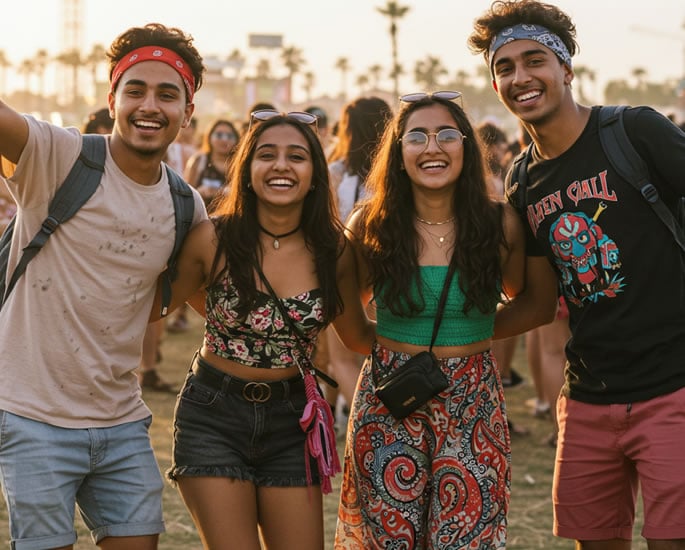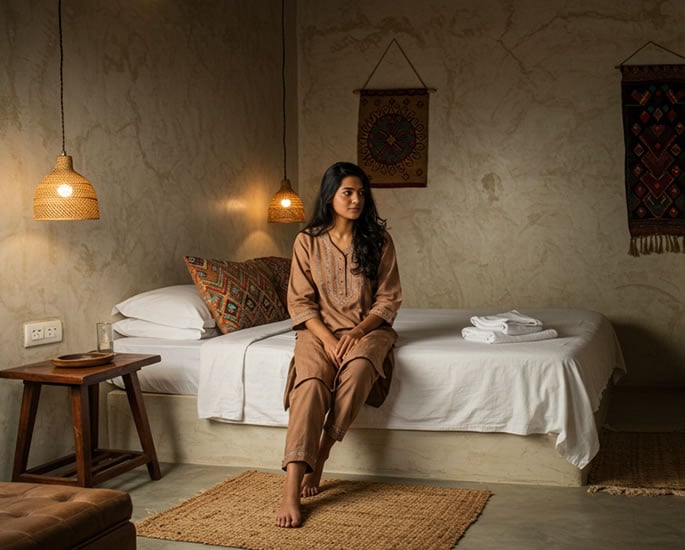Health and wellbeing have become central pillars
Luxury travel no longer means what it once did. Gen Z has pushed the industry into uncharted territory, guided by values, not vanity.
Across India and the rest of Asia, this generation is rethinking what it means to travel well, and the answers are turning decades of hospitality assumptions on their head.
Instead of five-star excess, the focus has shifted to self-expression, sustainability, and soul.
These are not occasional trends or passing preferences.
Gen Z is setting new standards for what the future of luxury looks like.
Travel, for them, is an active pursuit of meaning, woven with purpose, wellbeing, and cultural depth. And the rest of the industry is beginning to catch up.
Purpose at its Core

For Gen Z, luxury is closely tied to intention. The appeal of glossy brochures and impersonal opulence is fading.
Instead, they favour thoughtful choices that reflect their environmental and ethical values.
Surveys across Asian markets show a clear pattern: more than 70% of Gen Z travellers weigh environmental impact heavily when selecting luxury accommodation.
A significant majority are prepared to pay higher prices for stays that demonstrate genuine sustainability.
That includes everything from buildings designed to minimise energy use to hotels that source materials and staff locally.
Hospitality brands are under pressure to prove they’re not just marketing ideals but are acting on them.
Transparency matters. Gen Z wants evidence that the businesses they support are contributing to communities and preserving ecosystems.
Wellness a Priority

Health and wellbeing have become central pillars of Gen Z’s travel decisions.
But the expectation has gone far beyond spa access and gym facilities. What this generation seeks is deeper experiences that support mental clarity and emotional balance.
Close to half of Gen Z travellers now base their destination choices on wellness offerings.
The emphasis is on tailored experiences: nature immersion, spiritual retreats, and practices rooted in local traditions.
There is growing interest in sound therapy, guided meditations in open landscapes, and Ayurvedic cooking sessions designed to restore balance.
These aren’t just relaxing touches; they’re essential components of a travel experience.
Gen Z is navigating a fast-paced, hyperconnected world. In response, their holidays often serve as resets.
Travel meets the Digital Self

Every journey is a story, and Gen Z is telling theirs online in real time.
Social media platforms such as TikTok and Instagram now shape how young people plan, experience, and reflect on their travels.
In Malaysia, over 75% of Gen Z travellers said social media content influenced their destination choices.
Short videos, creator recommendations, and aesthetic visuals are stronger motivators than traditional guidebooks. But behind the curated visuals lies a more personal motivation: identity-building.
Travel has become part of how Gen Z presents their values, interests, and style.
The places they visit and the moments they share say as much about them as the clothes they wear or the music they love.
This digital dimension doesn’t cheapen the experience. It amplifies it, connecting people to ideas and communities they may never have encountered otherwise.
Food as a Cultural Gateway

Culinary experiences remain a strong draw, but the definition of a luxury meal has evolved. Fine dining no longer holds a monopoly on indulgence.
Gen Z finds just as much satisfaction in discovering a beloved local food stall or joining a shared table in a tucked-away neighbourhood café.
An overwhelming 92% of respondents across Asia listed food as a key reason to travel. But their preferences reveal a deeper connection to place.
The goal is to understand culture through taste, whether that’s a heritage dish made from scratch or a family-run restaurant passed down through generations.
Food isn’t just something to enjoy; it’s a direct line into the soul of a city.
Gen Z travellers are curious about what people eat, how meals are prepared, and what stories they tell. That curiosity transforms everyday dining into cultural discovery.
Experiences Shape the Itinerary

Gen Z doesn’t view travel as a break from routine; they see it as a vital part of life.
Their trips are often timed around cultural events, festivals, or moments that matter. The destination is important, but the experience itself takes priority.
There’s growing enthusiasm for “set-jetting”, travelling to locations seen in films or TV shows, and for events like concerts, exhibitions, or sporting tournaments.
Gen Z engages fully, planning journeys around shared passions and immersive activities.
This shift is influencing tourism boards and event organisers, who are now tailoring campaigns to highlight experiences over landmarks.
For Gen Z, meaningful memories begin with stories, not scenery.
Hospitality That Feels Human

The traditional definition of five-star service, formality, procedure, and perfection, is being challenged.
Gen Z is looking for something more relatable. Emotional intelligence is now a key marker of good hospitality.
Rather than being impressed by prestige, they respond to places that feel authentic and connected to their surroundings.
Whether it’s a minimalist eco-cabin in the hills or a stylish co-living space in a bustling city, the goal is alignment.
The best travel experiences are the ones that reflect who they are and what they value.
This has pushed the hospitality sector to focus on storytelling, local partnerships, and flexible offerings. Gen Z wants space to think, breathe, and connect.
Properties that provide solitude, creative freedom, or community-building are far more attractive than those offering generic luxury.
Reimagining What Luxury Really Means

The most striking change lies in how Gen Z defines luxury itself. They’re not chasing status symbols. They’re aligning with meaning.
Time, attention, and authenticity carry more value than size or cost.
A solo retreat in nature, a locally run wellness centre, or an immersive street food tour can all carry more prestige in the eyes of a Gen Z traveller than a stay at a global hotel chain.
The industry is learning that delivering luxury today means adapting to a more nuanced and emotionally intelligent audience.
For Gen Z, the best journeys aren’t necessarily the most expensive; they’re the most transformative.
Gen Z has reshaped the future of travel.
With each booking, they’re rejecting outdated ideals and championing conscious, personalised, and purpose-driven experiences.
The hospitality industry is now being forced to re-evaluate what luxury means and who it serves.
This generation isn’t travelling to impress others. They’re travelling to better understand themselves and the world.
That mindset is pushing hotels, destinations, and brands to evolve, or risk becoming irrelevant.
What emerges is a new kind of luxury. One defined not by price tags, but by connection, story, and substance.
And that’s a change the travel world can’t afford to ignore.






























































